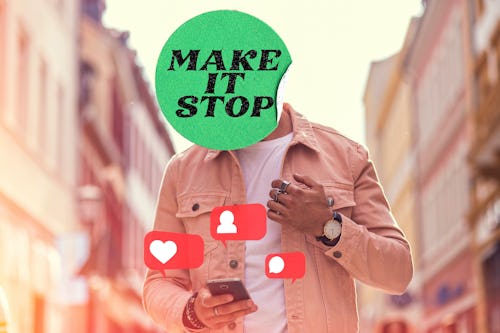
Imagine you’re in a shopping mall, and a random guy walks up to you to ask if you can briefly hold a bouquet of flowers for him — but then, instead of asking for his flowers back, he wishes you a good day and walks away. Now imagine going on social media and seeing a video of that interaction, only to realize that the seemingly intimate moment was secretly being filmed for a TikTok channel with millions of followers and dozens of comments that praise the random guy’s actions and lament the fact that you ‘probably need a hug.’
That’s exactly what happened to a woman in Melbourne, Australia, who told ABC Radio Melbourne she felt the interaction with TikToker Harrison Pawluk (@lifeofharrison) was “dehumanizing” and “patronizing.” But he’s not the only creator on the platform who gets off (and probably gets rich) from supposed good deeds that no one asked for. There’s an entire niche of mostly white men who perform, film, and post “random acts of kindness” that are performative at best and emotionally damaging at worst. It reeks of white savior complex, and it’s time we talk about it.
At first glance, “random acts of kindness” TikTok seems harmless; the videos include TikTokers giving a homeless man $500 to get a hotel room, paying for a woman’s groceries while she’s distracted, and buying a “random” girl makeup while reassuring her that she doesn’t “actually need makeup” (whoa, feminism!). But the more you scroll through these videos, it’s easy to notice an uncomfortable pattern: The (again, mostly white) men who are giving shit away never really approach other able-bodied, young, white men. The victims of their kindness sprees are almost always women, people of color, or the elderly — perpetuating the idea of a “nice white guy” who selflessly dedicates himself to the betterment of minorities, while gaining opportunities and fame along the way.
These TikToks are, in my mind, the latest frontier in the White-Savior Industrial Complex, as writer Teju Cole referred to it in The Atlantic back in 2012. “This world exists simply to satisfy the needs — including, importantly, the sentimental needs — of white people and Oprah,” writer Teju Cole tweeted in a thread preceding the article, as a response to the viral KONY 2012 video. “The White Savior Industrial Complex is not about justice. It is about having a big emotional experience that validates privilege.”
The victims of their kindness sprees are almost always women, people of color, or the elderly — perpetuating the idea of a “nice white guy” who selflessly dedicates himself to the betterment of minorities, while gaining opportunities and fame along the way.
By only focusing on certain types of benefactors, “acts of kindness” TikTokers are merely reinforcing existing power dynamics intended to make another certain type of person (i.e. young, straight, male, and white) feel good about themselves for caring about people different than them. It also assumes that any type of attention we receive from white men, including something as impractical as a bouquet of flowers that you then have to carry around, is going to improve our quality of life (cue the aforementioned Australian woman who was just trying to enjoy her damn lunch).
Essentially, it feels like these TikToks mostly exist for men to convince themselves and others that they’re good people, without ever directly acknowledging or uttering words like “misogyny” or “racism,” systems from which they benefit. And sure, the “acts of kindness” they film may temporarily help the homeless man who is receiving a few hundred bucks, but it would be insincere to say that it’s not all done primarily with followers and clout in mind.
And I have more concerns with these TikToks beyond the white saviorism, too. For one, some of the influencers ask their audience to send them money, which they say will be distributed to strangers — but without a transparent mechanism that ensures they aren’t pocketing some (or a lot of it) for themselves. Also, people on the receiving end of the good deeds are often caught in the worst times of their lives. Homelessness and poverty are deeply traumatic experiences, and few people would want those moments remembered and re-watched by millions — in many cases, without consent — especially if it’s a way for others to profit and feel better about themselves.
Among all of the dehumanizing things I found on “acts of kindness” TikTok, the most unsettling were the ones in which content creators made people work for the money or pushed them to articulate just how desperate they were for a few dollars. In one video, the reigning king of this genre, Jimmy Darts (@jimmydarts), asked a homeless Black man to throw a football back and forth with him in honor of Father’s Day. “Baby’s got hands,” he yells at the man as they play catch. “Oh, Tom Brady!” I don’t know about y'all, but watching this feels deeply patronizing — it’s how I would usually speak to a child. Just give the man the damn money and walk away.
A suggestion for some of these TikTokers: You might benefit from taking the time to sit down and have a real conversation with women, people of color, and the elderly about what would actually improve their lives, instead of assuming what they need — or that they’re even in distress at all. Not all women want flowers, and not all people of color need extra cash. And please, for the love of God, try to do one good thing without telling the whole world about it.







